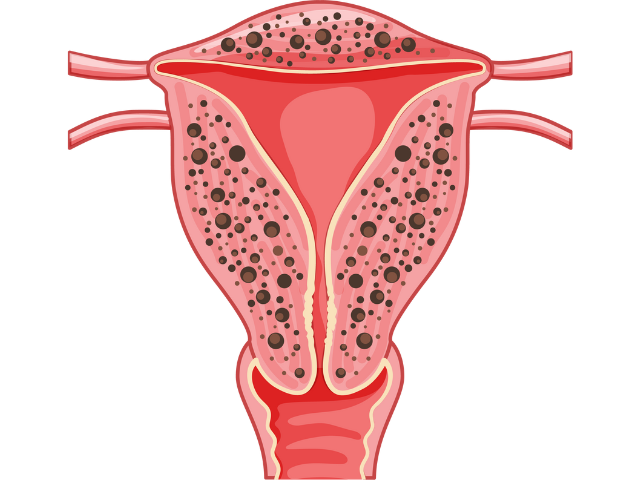Adenomyosis can cause painful menstrual cramps, lower abdominal pain, pressure, bloating before periods, and heavy menstrual bleeding. At KK Virat Hospital, our expert gynecologists specialize in diagnosing and treating adenomyosis with advanced medical technology and personalized treatment plans.
What is Adenomyosis?
Adenomyosis is a condition where the inner lining of the uterus (endometrium) invades the muscle wall of the uterus. This leads to thickened uterine walls, distorted blood vessels, and symptoms such as:
- Heavy and painful periods
- Chronic pelvic pain
- Pain during intercourse
- Fertility issues
Adenomyosis is different from endometriosis but can sometimes co-exist with it.

Grades of Adenomyosis
Adenomyosis is classified into three grades based on severity:
- Grade III (Severe): Deep invasion into the uterine muscle, causing significant symptoms
- Grade I (Mild): Minimal invasion of the uterine muscle
- Grade II (Moderate): Partial invasion affecting the middle layers
Risk Factors for Adenomyosis
Certain factors increase the risk of adenomyosis, including:
- Having at least one prior pregnancy
- Genetic predisposition
- Being of reproductive age (30-50 years)
Symptoms of Adenomyosis
Common symptoms include:
- Chronic bloating and lower abdominal discomfort
- Heavy menstrual bleeding (Menorrhagia)
- Severe cramps and pelvic pain
- Painful intercourse (Dyspareunia)
- Blood clots during periods
Diagnostic Tests for Adenomyosis
Adenomyosis is diagnosed through:
- MRI Scan: Provides a detailed image of the uterine tissue, confirming the presence and severity of adenomyosis.
- Pelvic Exam: A doctor may detect an enlarged or tender uterus.
- Ultrasound: Identifies thickening of the uterine walls and abnormal tissue growth.
Fertility Treatments for Adenomyosis
For women with adenomyosis struggling to conceive, we offer:
- Surrogacy (if required for severe cases)
- In Vitro Fertilization (IVF)
- Intracytoplasmic Sperm Injection (ICSI)
Adenomyosis Treatment Options
Adenomyosis treatment depends on the severity of symptoms and reproductive goals.
Non-Surgical Treatments
- Pain management with NSAIDs (e.g., ibuprofen)
- Hormonal therapy (birth control pills, IUDs, GnRH agonists)
- Endometrial ablation (for symptom relief without surgery)
Surgical Treatments
Hysterectomy (Uterus Removal Surgery):
Hysterectomy is a definitive treatment for adenomyosis and can be performed using:
Total Laparoscopic Hysterectomy (TLH): A minimally invasive approach using small incisions, ensuring a faster recovery (1-2 weeks).
Abdominal/Open Hysterectomy: A larger incision is made for uterus removal, requiring a longer recovery (5-6 weeks).
Pre-Treatment Considerations
Before starting treatment, your doctor will evaluate:
- Prior treatment history
- The severity of symptoms
- Reproductive plans
- Overall health conditions
How to Prepare for Hysterectomy for Adenomyosis?
To ensure a smooth surgical experience, follow these guidelines:
- Bring loose clothing and sanitary pads for post-surgical care.
- Disclose all medications to your doctor, including supplements and blood thinners.
- Control high blood pressure and diabetes before surgery.
- Avoid eating or drinking 4-6 hours before the procedure.
- Reduce smoking, alcohol, and recreational drug use two weeks before surgery.
- Avoid shaving the surgical site yourself to prevent infections.
Does Insurance Cover Adenomyosis Treatment?
Most health insurance policies cover hysterectomy and other adenomyosis treatments. Our hospital assists with all paperwork and insurance claims to provide a seamless experience.
Post-Treatment Recovery and Care
After adenomyosis treatment, follow these steps for a smooth recovery:
- Emotional Support: Hormonal changes may affect mood; seek support if needed.
- Rest & Hydration: Ensure proper rest and drink plenty of fluids.
- Pain Management: Take prescribed pain relievers as instructed.
- Avoid Heavy Activities: Limit lifting and strenuous work for a few weeks.
- Follow-Up Appointments: Regular check-ups to monitor recovery and prevent complications.
Does Insurance Cover Adenomyosis Treatment?
Most health insurance policies cover hysterectomy and other adenomyosis treatments. Our hospital assists with all paperwork and insurance claims to provide a seamless experience.
Why Choose KK Virat Hospital for Adenomyosis Treatment?
At KK Virat Hospital, we provide expert gynecological care for adenomyosis with experienced specialists and advanced technology for accurate diagnosis and minimally invasive treatments. Our personalized treatment plans ensure the best care for each patient. We offer confidential consultations, insurance support, minimal waiting times, and admission process. Post-surgery follow-ups are also provided to ensure a smooth recovery.
Book Your Appointment Today
Booking an appointment with our expert gynecologists is easy. Simply:
- Call Us Directly: Contact our medical coordinators to schedule an appointment with an expert Gynecologist.
- Direct Visit: If you have a medical history, you can visit our hospital directly by carrying your previous medical records. However, admission will be based on the doctor’s recommendation.
What is the cost of hysterectomy for adenomyosis treatment in Karimnagar?
The cost of a hysterectomy for adenomyosis varies based on the hospital, surgeon’s expertise, and type of surgery (open or laparoscopic). Contact us for an estimate based on your specific case.
Which are the best hospitals near me for adenomyosis treatment in Karimnagar?
KK Virat Hospital is one of the best hospitals for adenomyosis treatment, offering expert gynecologists, advanced technology, and personalized care.
Can I eat anything before hysterectomy surgery for adenomyosis?
No, you should not eat or drink anything for at least 4-6 hours before the surgery to avoid complications with anesthesia.
How long does the hysterectomy surgery take?
The procedure usually takes between 1 to 2 hours, depending on the surgical approach and complexity.
Does hysterectomy treatment require a hospital stay?
Yes, most patients need to stay in the hospital for 1-2 days after surgery for monitoring and initial recovery.
Does insurance cover the adenomyosis treatment cost?
Yes, many health insurance plans cover hysterectomy for adenomyosis. Our team can assist with insurance claims and paperwork.
How long does the recovery take after hysterectomy surgery?
Recovery varies depending on the type of hysterectomy. Laparoscopic hysterectomy takes about 1-2 weeks, while open surgery may require 4-6 weeks for full recovery.
Can a woman have sex after a hysterectomy?
Yes, but doctors usually recommend waiting at least 6-8 weeks after surgery to allow complete healing and avoid complications.
Will I experience menopause after a hysterectomy for adenomyosis?
If your ovaries are removed during the surgery, you may enter menopause immediately. If they are preserved, you may not experience immediate menopausal symptoms.
What are the alternatives to hysterectomy for adenomyosis?
Non-surgical treatments include hormonal therapy, pain management, and endometrial ablation. However, a hysterectomy is the most effective option for severe cases.



